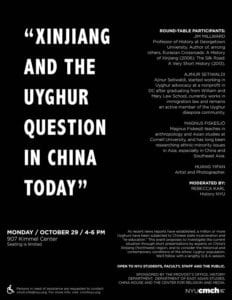In addition to our Friday Colloquium (stay tuned for schedule), we have a number of special events in Spring 2020. These build toward a second round of grant applications for research projects that will be designed to enrich our evolving three-campus Global Asia curriculum. We have organized our research to focus on three broad themes, to be based on our three campuses. All of this work will combine the diverse multi-disciplinary perspectives and wide range of scholarly interests that define our Global Asia intellectual community.
“The Space of the Belt-Road-Initiative” (NYUSH).
“Mobility and Migration” (NYUNY)
“Environments” (NYUAD)
Special events in New York in Spring 2020 concern people living in spaces of mobility divided by national state state borders in the twentieth century.
Wed Feb 12, 5:00-7:00. “Beyond the Crisis Narrative: Entangled Pasts and Possible Futures of Rohingya in Bangladesh and Burma.” Room 743 BOBST LIBRARY, 70 Washington Sq. South, New York University
Speakers: Shireen Huq, Founder, Narippokho. Mabrur Ahmed, Director, Restless Beings. Rahima Begum, Co-Director, Restless Beings. Zaid Hydari, Co-founder, Refugee Solidarity Network.
Moderator: Dina M. Siddiqi, Liberal Studies
We will use this opportunity to:
1) disentangle the various myths and narratives around Rohingya identity and claims to Myanmar citizenship, especially in relation to Bengali/Bangladeshi identity;
2) analyze the multilayered and often contradictory implications — for the Bangladeshi state, transnational actors, and various communities within its borders — of living in/hosting what is now apparently the world’s largest refugee camp;
3) explore possibilities for moving forward, and the implications of the recent ICJ judgment; and
4) Locate and contextualize the Rohingya expulsion in light of similar processes elsewhere in the postcolonial world, with particular attention to the implementation of the National Register of Citizens in Assam.
Feb 24. 6:00-8:00 Marilyn Young Memorial Lecture, NYU Ballet Center, 20 Cooper Square.
Fri-Sat Feb 28-29. 12th Annual NYU Global South Asia Conference: “Afterlives of Decolonization.” Kevorkian Library, Fri 5-7, Sat 9-5
Tues Feb 25 and Tues March 3. “Border Talks.” Center for the Humanities, 20 Cooper Square 5th Fl, 5:00-7:00. (These talks frame conceptual approaches to borders and explore spaces of mobility/immobility, imaginaries of closure or opening, and acts of resistance.)
February 25.
Julie Mostov (Liberal Studies) “Resisting the Challenge of Hard Borders”
Christian Martin (Center for European and Mediterranean Studies) “Structural Transformation of Democracy: Globalization and Conceptions of National Borders”
David Ludden (History) “A History of Violence – Borders and South Asia”
Cristina Beltran (Social and Cultural Analysis)”Migrant Violence and the Dream of Frontier Freedom.”
Simón Ventura Trujillo (English) “The Borderlands and Insurgent Horizons of Latinx Studies.”
March 3
Dina Siddiqi (Liberal Studies) “Bordering Practices and the Making of Muslim Bodies.”
Natasha Iskander (Wagner School of Public Policy) “How the Border Splits the Body”
Jini Kim Watson (English and Comparative Literature) “Genres of the Borderscape: Behrouz Boochani and Australia’s Offshore Detention ‘Regime’”
Vasuki Nesiah (Gallatin School of Individualized Study)”Spatial Imaginaries of Closure”
Marie Cruz Soto (Gallatin School of Individualized Study) “Colonial Borders: Puerto Rico and the US Empire”
Tues March 31. 5PM. Book Launch for Sanjib Baruah, In the Name of the Nation: India and its Northeast.

